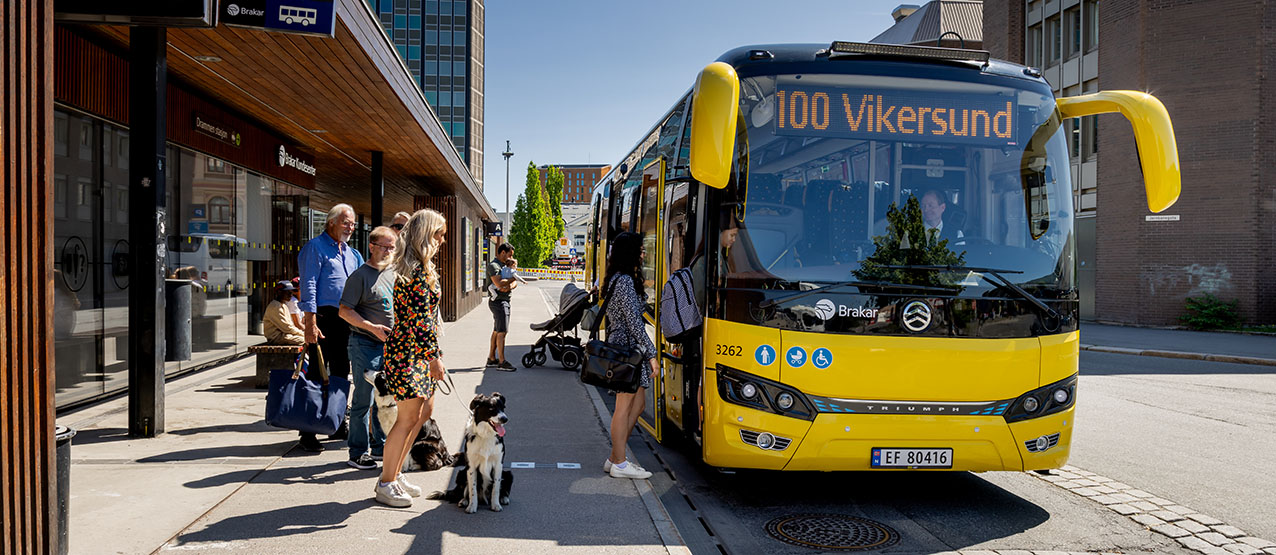
Transport Regulations for Brakar AS
These transport regulations constitute the foundations for operating public transport services in Buskerud, and have been approved by the Norwegian Ministry of Transport and Communications.
Chapter I Travellers
1 To whom the terms and conditions apply
These terms and conditions apply to journeys on scheduled bus services in Norway, and should be considered contractual terms between the traveller and the transport service provider.
2 Boarding and disembarking
If the local authorities have defined fixed stops along the routes, these must be used for boarding and disembarking. Where it is safe and secure and in line with the overarching traffic regulations, buses may stop for these purposes outside the fixed stops.
3 Prices – reimbursement
The transport service provider must apply price regulations, including price-reduction schemes, approved by the authority that the Norwegian Ministry of Transport and Communications has designated for the route in or bus company in question. The price regulations may also contain provisions regarding reimbursement of unused parts of travel passes. Information about prices and price reductions must be made readily available to travellers, including information about reimbursement schemes and where to make enquiries in this regard.
4 Tickets
The right to carriage is conveyed upon the purchase of a ticket or a pass. In the absence of any separate payment scheme, the ticket must be redeemed, and the pass presented when boarding. Travellers must check for themselves that they have received the correct ticket and change. Complaints must be made on the spot if possible. If a traveller fails to redeem their ticket within the applicable period, they must inform the vehicle operator as soon as possible, and no later than when leaving the bus.
Technical errors in the ticket solution are the responsibility of the Company, and travellers affected will be permitted to continue their journeys.
If travel cards are misused, or if an attempt is made to do so, the vehicle operator or ticket inspector may confiscate them on issuing a receipt. Travellers who refuse to pay a supplementary fee or hand over their travel cards may be reported to the police in pursuance of Section 403 of the Norwegian general civil penal code.
Pursuant to the Section 33 of the Act on Professional Transport by Motor Vehicle and Vessel [Professional Transport Act], Act no. 45 of 21 June 2002, passengers without a valid ticket may be detained. The terms and conditions for detaining travellers must be specifically approved by the Norwegian Ministry of Transport and Communications with regard to the transport terms of the individual company.
5 Supplementary charge ticket
Travellers who fail to produce a valid ticket during an inspection are obliged to purchase a supplementary charge ticket. This applies even if the traveller wishes to interrupt his/her journey. The supplementary charge is set by the Norwegian Ministry of Transport and Communications. Payment of the supplementary charge ticket entitles the traveller to continue his/her journey on the same terms which apply to the purchase of an ordinary ticket.
On payment of the supplementary charge on the spot, the charge is 750 NOK. 750,-.
6 Supplementary charge ticket – deferred payment
Travellers who fail to produce a valid ticket during an inspection, and who are also unable to pay for the supplementary charge ticket on the spot, are obliged to state their correct name, address and date of birth, and then await verification of their identity details so that the Company can subsequently collect payment of the supplementary charge. An extra fee may be added for sending an invoice. Travellers who do not pay the supplementary charge ticket on the spot are not entitled to continue their journey.
Failure to pay via bank transfer will trigger a reminder, and debt-collection will be instigated if necessary. This also applies to minors over the age of 15, who will, however, not be liable for debt-collection costs in connection with debt-collection proceedings. Guardians will be informed of the situation regarding failure to pay.
7 Detention of travellers without a valid ticket
The Company inspectors may detain travellers who:
a) fail to produce a valid ticket, and
b) fail to pay the supplementary charge ticket on the spot, and
c) fail to state their correct name, address and date of birth.
Travellers may be detained for as long as they fail to state their correct name, address and date of birth. Detention may also be exercised for the time it takes to verify the information provided by the person(s) in question. If a traveller nevertheless pays the supplementary charge ticket, he or she may no longer be detained.
Detention is not permitted if it would be deemed a disproportionate measure under the circumstances. Travellers under the age of 15 will not normally be detained.
8 Conduct
Travellers are obliged to show due consideration for other passengers and abide by usual safety regulations. Seatbelts and other safety equipment must be used when it is available. While the vehicle is in motion, it is not permitted to talk to or otherwise disturb the driver.
9 Smoking and intoxicants
Travellers are not permitted to smoke on the vehicles. Travellers are not permitted to ingest alcoholic drinks or other intoxicants on the vehicles.
10 Disruptions
The vehicle operator may refuse to carry travellers who are clearly under the influence of intoxicants, or who may otherwise cause problems or discomfort to the other travellers. Travellers whose conduct is likely to give offence or otherwise disturb other passengers may be asked to disembark if they fail to comply with requests to behave from the vehicle operator.
11 Liability regulations for travellers
Travellers who cause damage to buses and/or their furnishings will be obliged to pay compensation according to the standard rules and regulations for same.
Chapter II Goods
12 Hand luggage
Travellers are free to carry easily manageable items (hand luggage) with a total weight of up to 20 kg per ticket. Luggage must be positioned so that it does not cause a nuisance to other travellers, and does not obstruct people boarding or disembarking the vehicle.
13 Other goods
On payment of a goods carriage charge, travellers may bring heavier or larger objects or luggage if there is sufficient space and if the vehicle operator considers it reasonable. Such objects must be placed according to instructions from the vehicle operator.
Strollers may be brought on board if there is sufficient space, and they must be placed according to instructions from the vehicle operator. Bicycles that can be disassembled or collapsed can be carried in the load compartment. Other bicycles will only be carried on buses with bicycle racks or other designated spaces, as long as there is sufficient space and the driver considers it reasonable.
14 Live animals
The transport service provider is under no obligation to carry live animals. The vehicle operator is free to determine whether or not to allow animals onto the bus. Dogs must be kept on a leash during transport, and must be positioned such that they do not disturb other travellers. Passengers with animals that display aggressive behaviour or otherwise disturb travellers may be asked to leave the bus.
15 Liability and compensation for loss of or damage to goods
The transport service provider cannot be held liable for loss of or damage to objects carried free of charge, unless ill will or gross negligence on the part of the vehicle operator can be proven. Otherwise, the Company’s liability is regulated by the Norwegian Automobile Liability Act of 3 February 1961.
For goods carried against payment – cf. Section 9 – the transport service provider is responsible for loss or damage that affects the goods from the time they are brought onto the bus up to the destination point. This does not apply, however, if the loss or damage is attributable to a fault or negligence on the part of the traveller who brought the goods with him/her.
The provisions of the Norwegian Road Transport Act of 20 December 1974 shall apply when determining the amount of compensation payable. Section 32, paragraph 2 of said act states that for domestic carriage, compensation cannot exceed SDR 17 per kilogram of the gross weight of the goods lost. (SDR (Special Drawing Right) is an international unit of value set by the International Monetary Fund).
16 Claims
Parties wishing to claim compensation pursuant to the provisions of Section 11 must do so within a reasonable period and without undue delay.
Chapter III Liability and compensation
17 The Company’s liability for delays and cancellations
The transport service provider shall, as far as possible, inform passengers of cancellations, delays and other disruptions to operations, and state what steps passengers need to take in the given situation. Passengers should allow for minor delays.
Delays that already exist when the carriage agreement was concluded are considered to have been accepted by the passenger. If a service is cancelled or discontinued, the transport provider shall, on the basis of the conditions applicable in the given situation, take steps to arrange onward transport within a reasonable period. What constitutes “within a reasonable period” will be determined on a case-by-case basis. Where onward transport has not been arranged, or has not been arranged within a reasonable period, travellers will be entitled to compensation for such losses as they incur if the transport service provider has acted negligently. The losses incurred must be documented to the transport service provider. Compensation will only be paid for direct losses. Customers are obliged to attempt to limit their losses.
18 Liability for personal injury
In the event of personal injury, the traffic company is liable pursuant to the provisions of the Norwegian Automobile Liability Act.
Chapter IV Concluding provisions
19 Complaints
Any complaints about the transport service provider, the vehicle operator, or the execution of transport along the route are to be addressed to the office of the transport service provider. This also applies to complaints regarding the confiscation of passes/travel in accordance with Section 4 of these terms and conditions.
20 Information about the terms and conditions
The terms and conditions of carriage must be displayed in each and every vehicle when executing transport operations of the type covered by said terms and conditions. These terms and conditions must also be readily available to travellers, or it must be clearly stated how and where these terms and conditions are available. The name of the transport service provider and details of how to contact the company must also be stated.
21 Validity
The individual transport service provider may apply supplementary terms and conditions of carriage on conditions that these do not limit the travellers’ rights in relation to Sections 1–17 above.
